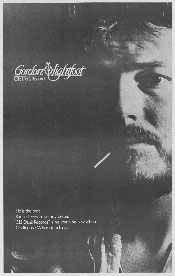![]()
  |

Old Dan's Records
Gordon Lightfoot
Reprise 2116
Released: November 1972
Chart Peak: #95
Weeks Charted: 12
 Gordon Lightfoot's ninth album, his fourth for Reprise, is more and better of same: middle-of-the-road, homogenized folk rock that is sumptuously pleasant, but lacking the indelible stamp of emotional veracity that would make it irresistible. Lightfoot is certainly an important talent, whose prolific output of good songs is continuously impressive. Yet the overall impression he conveys is one of glibness. With his exceptionally suave crooning style, which tries to seduce us more through surface beauty than through any gut-level attempt at expressiveness, he sounds a lot like Andy Williams.
Gordon Lightfoot's ninth album, his fourth for Reprise, is more and better of same: middle-of-the-road, homogenized folk rock that is sumptuously pleasant, but lacking the indelible stamp of emotional veracity that would make it irresistible. Lightfoot is certainly an important talent, whose prolific output of good songs is continuously impressive. Yet the overall impression he conveys is one of glibness. With his exceptionally suave crooning style, which tries to seduce us more through surface beauty than through any gut-level attempt at expressiveness, he sounds a lot like Andy Williams.
Lightfoot clearly wants to be all things to all people -- rustic folkie, cosmopolite, social commentator, and above all, the apostle of romantic love. Despite the remarkable facility and fine craftsmanship of his writing, these roles tend to overlap, resulting in work that too often is stylistically bland.
 Click image for larger view. |
- Stephen Holden, Rolling Stone, 3/29/73.
Bonus Reviews!
Gordon Lightfoot is undoubtedly one of the finest composers of today's music and his art is well showcased on this disc. Lightfoot takes the "If You Could Read My Mind" route on "It's Worth Believin'." Also offered is a smooth plaintive treatment on "Mother of a Miner's Child" and "Lazy Mornin'." Top quality and a top chart item.
- Billboard, 1973.
One of life's best things is the privilege of working hard at something that doesn't seem like work. Comes now Gordon Lightfoot with Old Dan's Records, a new album for Reprise that, on the surface, appears to have drifted naturally and effortlessly from Lightfoot's brain to the grooves on the disc. But check it out; it's rather a daring album, representing considerable growth, with no accompanying loss of taste or of any of Lightfoot's other virtues. True, one of the most satisfying cuts is "It's Worth Believin'," the kind of tightly paced ballad -- in the tradition of "Early Morning Rain" and "Second Cup Of Coffee" -- that Lightfoot does better than anyone, but most of the rest of this album is not so easily hooked up with preconceptions about what Lightfoot's music is.
"My Pony Won't Go" is a near-blues thing, with lyrics that metaphorically broach a subject that I don't think pop music has tackled before (no, I won't spoil it for you). "Lazy Mornin'" has Lightfoot, in the manner of Randy Newman, assuming a viewpoint he does not agree with, that of a complacent suburbanite. "That Same Old Obsession" draws a subtle unstated parallel with an old hymn that also uses a garden allegorically, and it amounts to a melody that is mildly suprising for Lightfoot and a verse that probes the depths in two directions at once -- I can see all sorts of political applications for it, for one thing. At the same time, the instrumentation throughout is less stylized than usual. We expect the main texture of Lightfoot's accompaniment to lie in the interplay between two acoustic guitars -- Red Shea's neat figures cast an octave above Terry Clements' more or less normal lead. But here Lightfoot makes judicious use of Larry Good's banjo and Bruce Good's just-right autoharp, and the possibilities of this more complex texture are fully realized on "Hi'way Songs."
The obvious clinker is the title song, and there a few other indications that Lightfoot is feeling his way -- but, cowabunga! is he advancing! It's all right to go on believing Lightfoot is the consummate troubador -- an informed, properly biased, sympathetic but moralizing and perceptive voice in a figure of earnestness and strength, with just a touch of swagger -- it's all right, but don't let it lead you to underestimate his depth.
- Noel Coppage, Stereo Review, 1973.
![]() Reader's Comments
Reader's Comments
No comments so far, be the first to comment.
